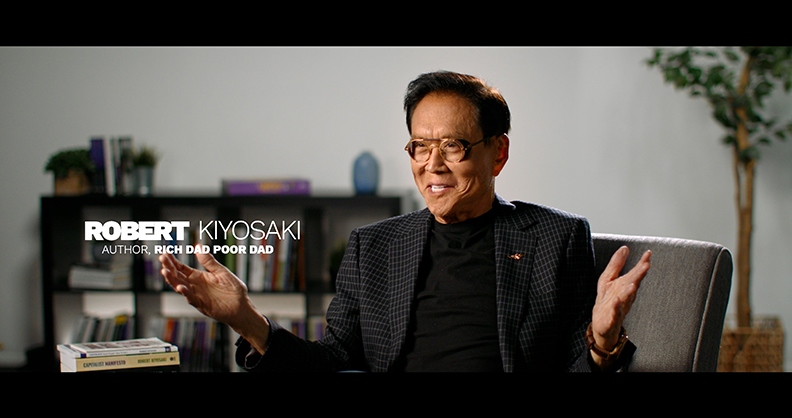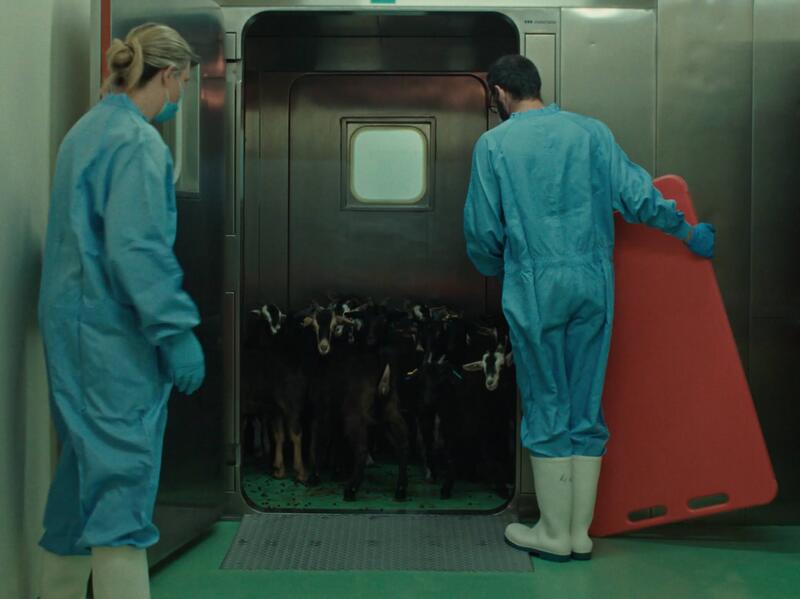
Decoding Bitcoin’s Promise for a Fairer Future
MOVIE REVIEW
God Bless Bitcoin
–
Genre: Documentary
Year Released: 2024
Runtime: 1h 29m
Director(s): Brian Estes, Kelly Estes
Writer(s): Natalie Brunell
Where To Watch: available to watch now here: www.godblessbitcoin.com
RAVING REVIEW: GOD BLESS BITCOIN examines today's entrenched financial systems, positioning Bitcoin as a revolutionary tool that might just rewrite the rules. This documentary traverses the landscape of cryptocurrency and religious ethics, challenging the traditional banking structures that have long dominated our economy. It exposes the stark realities of economic disparity while proposing Bitcoin as the linchpin for a more equitable financial future. Check out my Q&A with the directors (at the end of the review,) which helps clarify some of my questions about Bitcoin and the film itself.
The film crafts a compelling narrative around Bitcoin's potential to dismantle the economic underpinnings of warfare. By advocating for Bitcoin's decentralized approach, removing the power to fund conflicts from centralized entities could lead to a more peaceful world. This bold claim is underpinned by religious teachings and ethical considerations, painting a hopeful yet controversial vision of what a Bitcoin-driven economy could achieve.
However, the documentary didn’t investigate some cryptocurrencies' intricacies and potential drawbacks. I would have liked to have seen it look at the high volatility associated with Bitcoin and the significant technical challenges it faces, such as scalability issues inherent to systems. Furthermore, the documentary highlights the lack of regulatory clarity surrounding cryptocurrencies, adding layers of uncertainty and possible legal challenges that could affect users and the broader economic landscape.
At times, the film leans heavily into promotional territory, mainly when the commentators, who are significantly invested in Bitcoin, take the stage. This can occasionally cloud the narrative, as their enthusiasm for Bitcoin might be seen as compromising the documentary’s objectivity. The film straddles the line between advocacy and analysis, occasionally tipping into a near-evangelical endorsement of Bitcoin.
Despite these elements of bias, GOD BLESS BITCOIN acts as an informative primer for those unfamiliar with or skeptical about Bitcoin's role in financial reform. It encourages a broad audience to consider diversifying their financial portfolios and view Bitcoin as an investment and a potential foundation for a more stable economic future. The documentary ignites essential discussions on the sustainability of current monetary systems and the revolutionary potential of cryptocurrencies.
While GOD BLESS BITCOIN offers a robust educational exploration of Bitcoin, I remain ambivalent about fully embracing it as a replacement for traditional currency. My past investments still didn’t entirely clarify Bitcoin's potential role for me, and the film's pronounced bias, intertwining religious themes with economic principles, further complicates its message. The blend of religion with finance strikes an odd chord, making it more suited to a niche audience, such as attendees of a private religious school.
GOD BLESS BITCOIN invites viewers to critically evaluate the foundational aspects of global economic systems and ponder the ethical implications of embracing such transformative technologies. It effectively uses the interplay of technology, ethics, and finance as a narrative device to engage viewers in a dialogue about the future of money and the potential for significant societal change in our rapidly evolving digital landscape.
My Q&A with directors Brian Estes and Kelly Estes
The interviewer crafted the questions in this Q&A to delve deeper into the film's narrative and information about Bitcoin. The answers provided come directly from the film's directors and reflect their personal views, interpretations, and understanding of Bitcoin. As such, both the questions and the responses may carry inherent biases. This session is intended to offer additional insights into the film, enhancing understanding and appreciation.
Q: The opening scene sets an ambitious vision of reaching a billion views. Can you share what you ultimately hope to achieve with this film?
A: Our ultimate goal is to show people around the world how our current fiat-based financial system is diluting their purchasing power every time more money is printed. Because Bitcoin has a limited supply of 21 million and cannot be diluted, it protects a person’s purchasing power and becomes a form of money that holds its value over time. We present the information as a way to pique our viewer’s curiosity so that they think about how their money is working for them and study their options. In order to reach a billion views, we’re in the process of dubbing the film in 7 languages and subtitling it in over 15 languages.
Q: The film presents a perspective where $500,000 might not be sufficient for retirement. Could you explain the thought process or formulas behind this viewpoint?
A: This perspective comes from a baby boomer. In 1960, when they were in their 20s, $500,000 seemed like enough for them to retire on. But, because we have printed trillions of dollars after going off the gold standard in 1971, that $500,000 doesn’t purchase the same amount of goods and services as it would have. Even six years ago, if you had $500,000 in your retirement account, it would only purchase you $260,000 worth of goods and services today because we have printed 48% more dollars than were in existence then. Alan Greenspan, Chairman of the Federal Reserve for 20 years, addressed this theft in our financial system when he wrote, “In the absence of the gold standard, there is no way to protect savings from confiscation through inflation."
Q: How should we address environmental concerns related to Bitcoin mining?
A: Unfortunately, the media perpetuated this idea based upon a mistake that Cambridge University posted in a research report four years ago. At the time, the researchers were only calculating electricity used for mining “in front of the meter.” They were not considering the electricity that is used to mine Bitcoin, that is basically waste energy “behind the meter.” Six months ago, Cambridge’s new report took into consideration the “behind the meter” sources of electric like hydroelectric, geothermal, and carbon capture from flare gas. Now, their research indicates that Bitcoin mining is the greenest industry in the world because 58% of the electricity comes from renewable energy sources.
Q: With a cap of 21 million Bitcoins, what do you foresee happening when this limit is reached? How might this affect Bitcoin's value? It's already complicated enough to own .0008465434 of one Bitcoin
Clarification from the directors: (Bitcoin only goes out eight decimal points, so not sure what this number is. The smallest unit of Bitcoin is a satoshi, which equals 0.00000001 Bitcoin. Just for reference, it takes about 15 Satoshis to equal 1 penny.)
A: It will take about 120 years for the Bitcoin network to reach the 21 million mark. Today, there’s about 19.7 million Bitcoin that have been issued. The current rate of issue is 3.125 Bitcoin per ten minutes or 450 Bitcoin a day. This issuance rate gets cut in half about every four years; there have been 4 of these 32 “halvings" so far. Once the last Bitcoin is issued, which is basically a reward to incentivize people to clear transactions on the network, the network is designed to be supported by small transaction fees. As for the value, as time passes, the value will become more stable because more of the world will have adopted it. In our opinion, Bitcoin becomes the monetary layer of the world, just like gold was for 3500 years until 1971. Regarding the complication of owning Bitcoin, it is actually very easy to own. In the US, people can use Venmo, PayPal, River Financial, Swan Bitcoin, Coinbase, Kraken, Fidelity, and Strike, to name a few.
Q: Given the association between Bitcoin and scams, how do you envision overcoming this perception to foster wider adoption?
A: That is one of the hopes of the short companion film we made called What the FUD. Fear, uncertainty, and doubt (FUD) only scare people and slows down adoption. We laid out the misconceptions about Bitcoin being bad for the environment, being primarily used by criminals, and being shut down or hacked. We then brought in experts to reveal the truth about these misconceptions. What the Fud is available on www.godblessBitcoin.com for free. We are hoping people can see that and it gives them the tools to research more if they have questions.
Q: The style of the film is quite educational; do you see it as a tool primarily for informing younger audiences, like those in high school?
A: Our target audience is those who are most hurt by our current financial system so that spans all ages. It’s great for high schoolers because it shows them how our current system works and allows them to think of ways they could mitigate that as they plan for the future; it’s great for college students and those in the workforce as they think about their careers and how to preserve the wages they earn; it’s great for retirees and those on fixed incomes because it allows them to evaluate how their current savings are working for them. On a global scale, we hope it opens the eyes of the unbanked and those excluded from their financial systems; we hope they see that Bitcoin can be a payment network for their livelihood, as well as a tool to preserve and protect their savings for future generations.
Q: The documentary does a great job of diving deep into the subject, but Bitcoin can still be complex for many. How do you see us bridging the gap to make Bitcoin understandable to the average person?
A: We are so glad to hear that our documentary is able to open the door to understanding Bitcoin. And, yes, we agree that it is a complex issue. One of the best resources we have found is a website called hope.com. Here, people will find free educational materials to help them understand and learn more about Bitcoin.
Q: You mentioned Bitcoin donations to Ukraine in the film. Until Bitcoin becomes more universally adopted, how effective do you think such contributions are in helping the average person?
A: In countries where the governments have shut down bank accounts, like in Canada over the trucker’s strike, or where people are living under brutal regimes, like in Africa, Bitcoin is the difference between living and dying. So, Bitcoin is extremely helpful.
Q: The film explores Bitcoin as a potential solution to conflicts. How do you envision this concept evolving, and in what ways could Bitcoin become a standard in the U.S.?
A: Actually, Bitcoin is not a solution to conflicts; it prevents conflicts from beginning in the first place. Right now, when governments want to wage war, they simply print money to pay for that war. Because Bitcoin is capped at 21 million, governments couldn’t print money to wage war. They would have to either spend their Bitcoin or borrow money from their citizens by selling war bonds. If the citizens don’t buy the war bonds, there is no war because there is no money to fund the military-industrial complex.
Q: The film extensively discusses religious themes regarding Bitcoin. Could you explain the importance of this connection and the decision to focus on it?
A: We wanted to focus on the moral and ethical reasons to have sound money, which is money that cannot be diluted by printing more. So, we looked to the authority on morals and ethics, which are the sacred scriptures of the world’s religions. We brought in leaders from Judaism, Christianity, Islam, Buddhism, and Hinduism to explain what their texts teach about how we are to use money as we interact with each other and conduct commerce. Each religion has the same basic tenets: we are to use honest weights and measures, we are to reward each other fairly for work, we are to live abundant lives and have many children, and we are to do no harm with our money. That is the lens through which we evaluated fiat currency and Bitcoin as money.
Please visit https://linktr.ee/overlyhonestr for more reviews.
You can follow me on Letterboxd, Instagram, Twitter, and YouTube. My social media accounts can also be found on most platforms by searching Overly Honest Reviews.
I’m always happy to hear from my readers; please say hi or send me any questions about movies.
[photo courtesy of 360 DISTRIBUTION, GOD BLESS BITCOIN FILMS, LLC.]
DISCLAIMER:
At Overly Honest Movie Reviews, we value honesty and transparency. Occasionally, we receive free items for review, including DVDs, Blu-rays, CDs, Vinyl, Books, etc. We assure you that these arrangements do not influence our reviews, as we are committed to providing unbiased and sincere evaluations. We aim to help you make informed entertainment choices, regardless of our relationship with distributors or producers.
Amazon Affiliate Links:
Additionally, this site contains Amazon affiliate links. If you purchase through these links, we may receive a commission. This affiliate arrangement does not affect our commitment to honest reviews and helps support our site. We appreciate your trust and support in navigating these links.



Average Rating